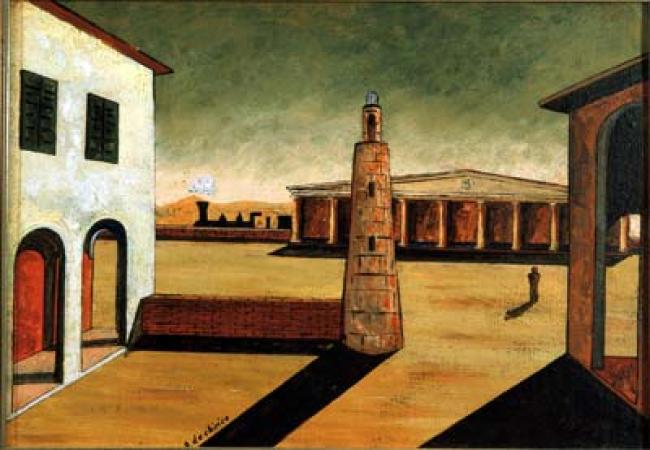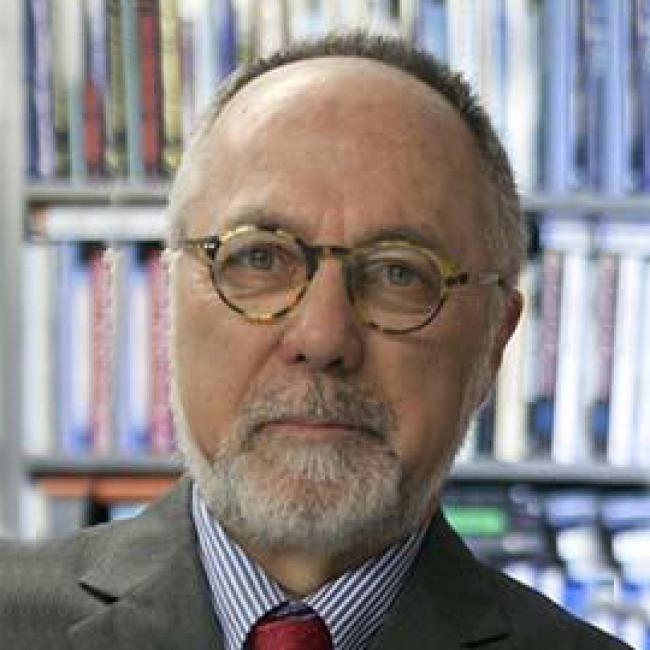Center for Study of Pluralism and the Civil Sphere

Giorgio de Chirico (Italian 1888-1978)
Piazza d' Italia (also titled Italian Plaza -- with Beacon)
dated 1921
Oil on canvas-wrapped cardboard
Gift of Lohrey Family Limited Partnership, Augustana College Art Collection, 2005.22
The Center for the Study of Pluralism and the Civil Sphere allow scholars to explore ethnic relations, immigration, citizenship and other topics related to diversity and civil society. It will bring well-known scholars to Augustana for conferences and will support the publications of Augustana faculty members.
Augustana College launched the Center for the Study of Pluralism and the Civil Sphere Jan. 25, 2010, and named Peter Kivisto, the Richard A. Swanson Professor of Social Thought, as director.
Dr. Kivisto is an internationally recognized sociologist who has taught and published in Finland, Germany and Italy. He has published more than 25 books and has taught at Augustana since 1982, where he is now chair of the department of sociology, anthropology and social welfare. His expertise and established place within the international academic community made him a natural choice to direct Augustana's new center.
Lecture videos
Frieze lecture: Ethnicity in the 21st Century
Serious Science: Religion and immigration
The sociology of religion
Multiculturalism and national identity
InLiberty: Citizenship

Purpose of the center
Dr. Kivisto is the Richard A. Swanson Professor of Social Thought and Chair of Sociology at Augustana College and Finland Distinguished Professor at the University of Turku.
His research involves a collaborative project on multiculturalism with colleagues in Finland. His interests include immigration, social integration, citizenship, and religion.
Among his recent books are Key Ideas in Sociology (Pine Forge, 3rd edition, 2011), Illuminating Social Life (Pine Forge, 5th edition, 2011), Beyond a Border: The Causes and Consequences of Contemporary Immigration (Pine Forge, 2010, with Thomas Faist), Citizenship: Discourse, Theory and Transnational Prospects (Blackwell, 2007, with Thomas Faist), Intersecting Inequalities (Pearson Prentice Hall, 2007, with Elizabeth Hartung), and Incorporating Diversity (Paradigm, 2005).
He is the past editor of The Sociological Quarterly and the current President of the Midwest Sociological Society. He serves on the editorial boards of Contexts, Ethnic and Racial Studies, and Journal of Intercultural Studies and on the publication committee for Sociology of Religion.
- The primary purpose of the center is to serve as a location for producing scholarship that is devoted to exploring the varied ways that a democratic society deals with diversity. Thus, it will be devoted to work that focuses on a range of topics, including but not necessarily limited to ethnic relations, immigration, inequality, social exclusion, religious diversity, civil religion, multiculturalism, contemporary social movements, citizenship, civil society, and the democratic prospect.
- In more concrete terms, the goal of the center is to provide the space for the director and other faculty members on campus to produce scholarly publications related to its thematic focus. As funding becomes available, this will include providing financial support for research projects and for course reductions. It will also provide students with opportunities to work as research assistants on cutting edge research.
- The center will also host conferences and lectures that would be designed to bring well-known scholars to campus.
- The center will support relevant student research, with the director and members of the Campus Advisory Board serving as faculty mentors for students working on projects related to its central focus, which could include but not be limited to advising senior inquiry projects. As finances become available, the center will be a source of funding for summer research projects, and the director would oversee such research.
- Students will also benefit by being involved in faculty research projects. They will also play a role in conference planning, and in that capacity would be in a position to meet and interact with prominent scholars visiting campus to participate in center events.
